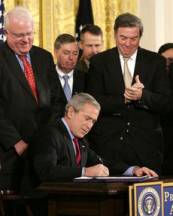By Miriam Raftery
 October 28, 2008 (San Diego's East County) - Duncan
October 28, 2008 (San Diego's East County) - Duncan
Duane Hunter seeks to capture the 52nd Congressional seat being vacated by
his father, 27-year Congressman Duncan Hunter. He has voiced
support for his father’s voting record yet chided his principal opponent,
Michael Lumpkin, for claiming that the Hunter family seeks a monarchy-like
transfer of power.
The question of legacy, then, is a legitimate campaign issue. Just how
closely would Hunter’s son follow in his father’s footsteps if
elected—and is that legacy a path that voters should support?
Of course, there’s no guarantee that a son elected to public office
will be a carbon copy of his father. The current President George
W. Bush has diverged sharply from his father on a number of issues. Still,
an examination of Congressman Hunter’s record, for which his son has
expressed admiration, is clearly one tool that voters may utilize to determine
which candidate to support in the November 4th election.
As Chair of the powerful House Armed Services Committee, Congressman Hunter
has unquestionably wielded influence. His best-known accomplishments
included bringing home the bacon for defense industry jobs and contracts in
San Diego County, though with reapportionment in recent years far fewer of
those jobs remain in the 52nd district.
He has stated in interviews that he was largely responsible for determining
which intelligence information members of Congress would see before determining
whether to approve the Iraq War, and has served as a spokesman in national
media interviews for the Bush administration on military matters ranging from
progress of the War to treatment of prisoners at Guantanamo.
 Citizens
Citizens
for Responsibility and Ethics in Washington (CREW), a nonpartisan citizens’ watchdog
group, listed the senior Hunter as one of the most corrupt members of Congress
in 2007, detailing 23 pages of purported corruption:
www.crewsmostcorrupt.org/files/beyond_delay_report.pdf
The CREW reported summarized its complaints: “Rep. Hunter’s
ethical issues stem from his connection to a number of people at the center
of the largest military corruption scandal of the decade -- connections that
have been investigated by the FBI4 -- and his earmarks for projects that benefit
his defense industry political donors, but that the military does not want.”
In addition to ethical issues surrounding his official work, CREW noted, “Rep.
Hunter purchased his home in a questionable land deal, escaped paying full
property taxes for many years on the home and gave conflicting reports of the
property’s true value. Rep. Hunter also used the power of his office
to financially benefit his brother and his presidential campaign has violated
federal election law.” CREW further criticized Hunter for his close relationship
with Randy “Duke” Cunningham, who was convicted of bribery and
described Hunter as his “mentor”, as well as Hunter’s
relationships with other key players in the Cunningham scandal.
Hunter’s son, to his credit, has called for transparency in Congressional
earmarks and pledged to provide the media with a full list of every item he
asks for in an earmark. But he defends the practice of inserting earmarks
for items not asked for by the President, Pentagon or Defense Department
if he believes items are important. “It’s your job as a representative
of the American people to put in what you think is needed,” he said. He
defended one of his father’s controversial earmarks for a new vertical
take-off and landing aircraft, noting that existing planes had a high percentage
of crashes and pilot deaths.
The Congressman’s son has continued the family tradition of accepting
large contributions from defense and military contractors. To date, Duncan
D. Hunter has reportedly raised over $1.2 million, including hefty contributions
from the defense industry, business interests, healthcare and pharmaceutical
industries, and ideological groups such as the Minute Men, though the largest
segment of contributors are individuals.
Mike Lumpkin, his Democratic opponent, has raised nearly $420,000 primarily
from individuals. To be fair, he has taken some sizeable contributions
from interest groups representing retirees, real estate interests, attorneys
and unions as well as $6,000 from defense interests. Full lists of donations
for both major party candidates can be viewed at www.fec.gov or www.opensecrets.gov.
(Libertarian Michael Benoit and write-in candidate Joe Ryan have not reported
any donations to the FEC.)
What about Congressman Hunter’s legacy on legislative matters?
According to Project Vote-Smart, sponsored by the nonpartisan League of Women
Voters, during his 27 year career in Congress Hunter has consistently received
high marks from some interest groups and low marks from others.
For example, through the years he has always scored 100% from the National
Right to Life committee for his anti-abortion votes, but regularly scored a
zero from Planned Parenthood for opposing measures related to birth control,
abortion and family planning.
He received an “F” from the National Education Association in
2007-2008 and low ratings from some other education groups including the National
Association of Elementary School Principals.
Tax-cutting and business/industry groups have given him high marks, including
a 100% from the Business-Industry Political Action Committee last year.
Hunter voted for a major deregulation bill which Sixty Minutes has faulted
for causing the current financial meltdown. He voted no on the recent
bail-out bill and no on a second measure to bring transparency and accountability
to commodity markets and to stop oil speculation.
He’s ranked high by the Center for Security Policy on national security
issues, but low by most civil liberties and civil rights groups.
Surprisingly, despite his verbal pledges to support military veterans, Hunter
received a “C” grade from Iraq and Afghanistan Veterans of American
in 2007-2008, a 50% rating from Disabled American Veterans in 2006 and a zero
from the DAV in 2005, the most recent years listed at Project Vote-Smart and
a big drop from the 100% rating he enjoyed in 2001.
Although Hunter has run as a “pro-labor Republican,” he in fact
supported the AFL-CIO union position only 17% of the time last year and ranked
between zero and 40% by other unions. In 2006, he received a zero from
the American Federation of State, County and Municipal Employees. He
has, however, drawn praise from labor groups for calling for reforms of NAFTA
and CAFTA, which have led to the outsourcing of jobs to other countries.
Hunter, who pushed legislation to turnover a national park to the military,
has drawn ire from environmentalists. He’s received the lowest
possible rating—zero—from the League of Conservation Voters, Defenders
of Wildlife Action Fund, and American Wilderness Coalition. He has, however,
receive high ratings from the American Land Rights Association and a 100% score
from the American Wind Energy Association.
He received an A rating last year from Gun Owners of America and high ratings
from the National Rifle Association.
On children’s issues, his record is mixed depending whose interpretation
of children’s best interests you believe. Children’s Defense
Fund ranked him 20% last year on bills to protect children and American Family
Voices gave him a dismal zero rating, though the Family Research Council ranked
him 58% and the American Family Association, a conservative group, ranked him
100%.
On healthcare, Hunter ranked zero last year from the American Academy of Family Physicians
and the Children’s Health Fund. In recent years he has also drawn
zero ratings from the American Public Health Association, AIDS Action Council,
American Nurses Association,, and National Rural Health Association. He
fared better with the American Academy of General Dentistry at 70% and the
Depression and Bipolar Support Alliance at 50%.
A staunch advocate of the border wall, Hunter has ranked highly with the Federation
of Immigration Reform, but poorly with pro-immigrant groups.
In his early years, Hunter ranked fairly well among senior citizens groups. But
in the past two years, the Alliance for Retired Americans has ranked him zero
and 11%. An interest group representing federal retirees, however, gave
him a 67% in 2005-06.
Even those who oppose Hunter politically have praised his office and staff
for responding to individuals in his district through constituent services. He
has been criticized, however, for rarely making public appearances in his district
beyond fundraising and PR events in recent years.
Hunter dropped out of the presidential primary earlier this year after receiving
no more than low single digit percentages in any state. He had among
the highest absentee rates in Congress this year, due largely to time spent
on the campaign trail.
For a complete list of Congressman Hunter’s voting record, interest
group ratings, campaign contributions, speeches and other information, visit www.vote-smart.org.
Miriam Raftery is a national award-winning journalist who has
been reporting on the 52nd Congressional district, including Congressman
Hunter, for many years.







Comments
On Humane Issues
Duncan Sr. scored a dismal 8% on the Legislative Score Card from the Humane Society Legislative Fund (the legislative arm of the Humane Society U.S.) in 2008. He scored a 17% in 2007. Pathetic!